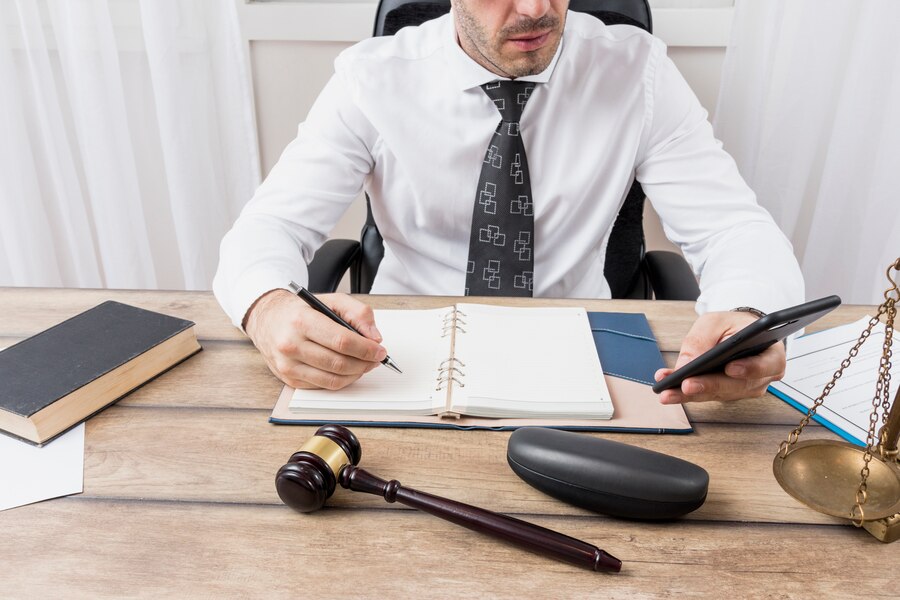Choosing The Right Personal Injury Lawyer In Oceanside
by Abdul Aziz Mondal Legal Published on: 13 February 2024 Last Updated on: 25 September 2024

Navigating the intricate jobrole of a personal injury lawyer can be a daunting endeavor, particularly when you’re situated in a bustling locale like Oceanside. A critical factor in this journey is the selection of an adept legal representative who possesses not only the necessary expertise but also a deep understanding of the local legal milieu.
This decision, seemingly straightforward, demands a measured approach, requiring considerations that extend beyond academic qualifications or years of practice. The reputation, accessibility, and local knowledge of the lawyer, as well as their past case results, play an equally crucial role. This brings us to the pivotal question: How does one discern the right personal injury lawyer amidst the sea of legal professionals? A closer look into these aforementioned factors may provide a clearer perspective.
Understanding Personal Injury Law

In the realm of legal practice, m stands as a complex field, encompassing numerous scenarios where individuals suffer harm due to the negligence or intentional actions of others. Understanding the nuances of this sector is integral to securing the best legal representation and adequately defending your rights. An Oceanside personal injury lawyer can provide the expertise needed to navigate these complexities.
One crucial aspect of personal injury law pertains to injury classifications. These categories, which range from physical injuries such as fractures or burns to emotional traumas like distress, play a significant role in shaping the trajectory of a case. Comprehensive knowledge of these classifications can aid in the accurate assessment of a claim’s validity and its potential compensation value.
Compensation types, another vital facet, are equally pivotal. Compensation can cover various areas including medical expenses, lost wages, property damage, and pain and suffering. Each of these areas requires careful evaluation to ascertain the full extent of damages. An experienced lawyer with a robust understanding of injury classifications and compensation types can significantly enhance the likelihood of a favorable outcome.
The Importance Of Specialization
Choosing a lawyer who specializes in personal injury law is crucial, as their in-depth understanding and experience within the field can significantly impact the outcome of your case.
Specialization benefits are numerous, but the most significant include:
Expert Knowledge: They are well-versed in the complexities of personal injury law, which can be advantageous in terms of strategic planning and in-court representation.
Extensive Experience: Personal Injury lawyers routinely handle cases similar to yours, so they will have a better grasp of what to expect and how to navigate it.
Higher Success Rate: Due to their expertise and familiarity, they are likely to have a higher success rate in obtaining favorable outcomes.
Negotiation Skills: They possess strong negotiation skills with insurance companies, which can lead to higher compensation.
Despite these benefits, it’s important to note potential specialization drawbacks. Specialized lawyers might charge higher fees due to their expertise. In addition, they may be less available due to high demand. Nonetheless, the expertise and potential for results that a specialized personal injury lawyer can bring to your case often outweigh these drawbacks.
Evaluating Legal Experience

When selecting a personal injury lawyer, it is paramount to evaluate their legal experience as it is a significant determinant of their abilities. This involves assessing the lawyer’s track record, understanding their specialization areas, and analyzing their past case success. These factors will provide a comprehensive overview of an Oceanside personal injury lawyer’s competence and expertise, thus informing your decision.
Assessing Lawyer’s Track Record
To ensure the most favorable outcome for your case, it is crucial to carefully evaluate the track record and legal experience of your prospective personal injury lawyer. The Track Record Importance cannot be overstated, as it directly correlates with the Lawyer’s Efficiency.
When assessing the lawyer’s track record, consider these four critical factors:
Successful Case Outcomes: Does the lawyer have a history of winning cases similar to yours?
Client Testimonials: What do previous clients say about their experience with the lawyer?
Legal Qualifications: What professional credentials does the lawyer hold?
Years of Experience: How long has the lawyer been practicing in the field of personal injury law?
An experienced lawyer with a proven track record can significantly increase your chances of a successful case outcome.
Understanding Specialization Areas
In the complex world of personal injury law, understanding a lawyer’s specialization areas is essential, as this will significantly contribute to efficiently navigating your case and achieving a favorable result. These legal specialties span various injury classifications, each requiring a unique approach and profound knowledge. From injuries due to car accidents to medical malpractice, the lawyer you choose should be well-versed in your specific injury type to ensure your rights are upheld.
Moreover, adherence to legal ethics is paramount. An attorney with a strong ethical foundation will put your interests first, advocating for your right to fair compensation with integrity and dedication. Thus, understanding specialization areas forms a crucial part of choosing the right personal injury lawyer.
Analyzing Past Case Success
Beyond understanding a lawyer’s specialization, it is equally important to evaluate their past case success as a credible measure of their legal experience and proficiency.
Case Documentation: A proficient lawyer should have a well-documented history of successful cases. This provides evidence of their competence and experience in handling similar cases.
Settlement Negotiations: A lawyer’s skill in settlement negotiations can significantly influence the outcome of a case. An attorney’s history in securing favorable settlements is a strong indicator of their negotiation abilities.
Winning Trials: Successful trial records are also a critical factor to consider. This reflects a lawyer’s ability to convincingly present a case in court.
Client Testimonials: These offer firsthand information about a lawyer’s professionalism, dedication, and case management abilities. Positive reviews are often a testament to a lawyer’s capabilities.
Assessing Lawyer’s Reputation

When selecting a personal injury lawyer, delving into the depths of their professional reputation is a crucial part of the decision-making process. A lawyer’s integrity, reflected in their ethical standards and honesty, forms the cornerstone of their reputation. This essential characteristic drives their decision-making, influences their interactions with clients, and impacts their standing within the legal community.
Peer endorsements also provide invaluable insights into a lawyer’s reputation. These endorsements, coming from fellow legal professionals, are often based on firsthand experiences and thus, carry significant weight. A lawyer with a high number of peer endorsements is likely to be recognized for their skills, expertise, and professionalism.
Online reviews and testimonials from previous clients can also offer a glimpse into the lawyer’s reputation. Positive reviews typically indicate a strong track record of client satisfaction and successful outcomes.
Therefore, an assessment of a lawyer’s reputation should consider the lawyer’s integrity, peer endorsements, and client feedback. This multi-faceted evaluation will help you make an informed decision, ensuring you choose a lawyer who not only possesses the requisite skills but also upholds the highest ethical standards. This is paramount in securing the best possible legal representation for your personal injury case. For a thorough evaluation and quality representation, consider consult with a personal injury lawyer in Oceanside.
Importance Of Local Knowledge
Navigating the complex terrain of personal injury law requires not just legal acumen, but also an intimate understanding of local laws and regulations. An attorney with in-depth knowledge of Oceanside’s local regulations and court procedures is invaluable in ensuring a successful outcome for your case.
Familiarity with Local Regulations: Local regulations can differ significantly from one jurisdiction to another. A local lawyer has a firm grasp of these regulations and how they apply to your case. This knowledge can be instrumental in formulating a winning strategy.
Knowledge of Court Procedures: Understanding local court procedures is equally essential. It includes knowing filing deadlines, court rules, and even the preferences of local judges. These details can significantly impact the progression of your case.
Access to Local Resources: A local attorney has established relationships with local experts, investigators, and medical professionals whose testimony can strengthen your case.
Understanding Community Dynamics: Familiarity with the local community can also be an advantage. It can aid in jury selection and provide insight into how your case might be perceived by a local jury.
Therefore, when choosing legal representation in Oceanside, consider the importance of local knowledge. It can be a defining factor in achieving a favorable outcome.
Client-Lawyer Communication
Establishing clear and effective communication between you and your personal injury lawyer is a critical aspect of building a strong case. This involves understanding the legal vocabulary used by your lawyer, which will enable you to follow the progression of your case accurately. It is essential that your lawyer explains complex legal terms in a manner that is simple and easy to comprehend. This will allow you to make informed decisions and actively participate in your case.
Confidentiality is another aspect that underlines the importance of communication in this relationship. Your lawyer should assure you that any information shared will be handled with the utmost discretion and used only for your case’s advancement. Trust forms the bedrock of effective communication, and confidentiality is a key component of this trust.
Moreover, open channels of communication mean that you can share every pertinent detail about your case without hesitation. This includes the nature of your injuries, the circumstances leading to the accident, and the impact on your life. Your personal injury lawyer should be approachable, responsive, and willing to clarify every doubt you have. Remember, clear and timely communication is your right and a crucial factor in securing a favorable outcome.
Case Preparation And Strategy
An integral part of a personal injury lawyer’s role is the effective preparation of your case and the development of a persuasive strategy. This includes the meticulous gathering of essential evidence and formulating powerful arguments to support your claim. A lawyer’s proficiency in these areas is crucial and can significantly impact the outcome of your case.
Gathering Essential Evidence
To build a compelling personal injury case, the meticulous gathering of essential evidence serves as the cornerstone of effective case preparation and strategy. The process involves:
Evidence preservation: The first step towards building a strong case is preserving all available evidence from accident scenes, and medical records to damaged properties. This ensures vital information isn’t lost or tampered with.
Witness interviews: Witnesses provide crucial insights that can tip the case in your favor. Their statements need to be thoroughly recorded and, if possible, supported with written affirmations.
Expert consultations: Specialists in fields related to your case can provide expert opinions, further solidifying your case.
Reviewing police and accident reports: These official documents can offer important details that support your claims.
Choosing the right personal injury lawyer ensures these steps are expertly handled.
Developing Powerful Arguments
In the realm of personal injury litigation, the development of powerful arguments is a critical component in case preparation and strategy, often determining the difference between a successful resolution and an unfavorable outcome. It involves the employment of argument efficiency, carefully crafting each point to reflect a clear, compelling narrative that aligns with the evidence. A proficient personal injury lawyer in Oceanside will leverage a variety of persuasion techniques, such as ethos, logos, and pathos, to influence the decision-makers. They will also anticipate potential counter-arguments, devising effective rebuttals in advance. This strategic approach can significantly enhance the chances of obtaining a just settlement or verdict, making the choice of lawyer all the more crucial.
Assessing Fee Structures
Understanding the fee structures of potential personal injury lawyers is critical in making an informed decision, ensuring you receive quality legal representation without breaking your budget. Fee Transparency and Payment Options should be at the forefront of your considerations.
The following points can guide you in assessing fee structures:
Contingency Fees: Most personal injury lawyers operate on a contingency fee basis, meaning they receive a portion of your settlement or court award as their fee. This can range from 25% to 40%, varying based on the complexity of the case and its progression in the court system.
Hourly Rate: Some lawyers may charge an hourly rate. This can be beneficial if your case is relatively simple and doesn’t require extensive litigation. However, it can become costly if the case drags on.
Retainer Fees: Some attorneys may ask for an upfront payment to be used as a “down payment” against which future costs are billed. Be clear about how this retainer is used and what happens if it is depleted before the case concludes.
Miscellaneous Costs: Understand what other costs may be involved. These might include court filing fees, expenses for expert witnesses, and administrative costs. Ensure your lawyer is transparent about these potential expenses.
Availability And Accessibility
In choosing the right personal injury lawyer, it is paramount to consider their availability and the ease of access to their services. A lawyer’s responsiveness and clear communication channels are vital in ensuring your case is handled expediently and effectively. Furthermore, the office location plays a significant role in fostering convenient, in-person consultations and meetings.
Evaluating Lawyer’s Responsiveness
When selecting a personal injury lawyer, a critical aspect to consider is their level of responsiveness, which encompasses both their availability and accessibility. This criterion, often overlooked, can significantly impact the progression and outcome of your case. To effectively evaluate a lawyer’s responsiveness, consider the following aspects:
Client responsiveness: How quickly does the lawyer or their office respond to your inquiries? Prompt responses indicate respect for your time and case.
Communication efficiency: Are they able to explain complex legal matters in a way that is understandable to you?
Availability: Is the lawyer able to meet with you at times that work for your schedule?
Accessibility: Can you reach your lawyer directly, or are you always dealing with intermediaries?
Understanding Communication Channels
Building upon the evaluation of a lawyer’s responsiveness, it’s essential to explore more deeply the specific communication channels that determine a lawyer’s availability and accessibility. Communication barriers, such as a lack of understanding of technology or a heavy reliance on specific modes of communication, can significantly impact accessibility. The ability to adapt and communicate effectively through various channels, from emails and phone calls to video conferencing, is vital. Moreover, language proficiency is another crucial factor. A lawyer must be able to articulate complex legal jargon in layman’s terms for the client to understand their case better. Therefore, when choosing a personal injury lawyer in Oceanside, consider these factors to ensure seamless communication and effective representation.
Importance Of Office Location
Though often overlooked, the geographical location of your personal injury lawyer’s office plays a pivotal role in ensuring both availability and accessibility, directly impacting the efficiency of your legal proceedings.
Office Accessibility: A conveniently located office reduces travel time and expenses, facilitating frequent face-to-face consultations.
Geographic Convenience: An attorney in your locale is more likely to have a profound understanding of local laws and court procedures, thereby providing a strategic advantage.
Swift Response: Proximity allows you to quickly reach your lawyer’s office in case of urgent matters needing immediate attention.
Court Appearances: A nearby office location ensures your lawyer can easily attend court sessions, crucial for a successful personal injury case.
A thoughtfully chosen office location can significantly enhance your legal representation experience.
Comfort Level And Trust

The rapport you have with your personal injury lawyer significantly influences the level of comfort and trust you can establish with them in your legal journey. Personal rapport is more than a cordial professional relationship; it’s a bond that assures you of your attorney’s commitment to your case. This bond grows through open communication, consistent feedback, and attorney empathy, allowing you to freely express your concerns without fear of judgment or misunderstanding.
Being a victim of personal injury is distressing, and having a lawyer who empathizes with your situation can make the recovery process less daunting. Attorney empathy involves understanding the emotional and physical pain you’re going through and using this understanding to passionately advocate for your rights.
Moreover, trust is an essential component in this relationship. You should have complete confidence in your lawyer’s skills, ethics, and dedication to your case. A trustworthy attorney will keep you informed about your case’s progress, respect your decisions, and protect your privacy.
Ultimately, establishing a personal rapport and a high level of comfort and trust with your attorney can significantly affect the outcome of your case. Thus, when choosing a personal injury lawyer in Oceanside, these factors should be given serious consideration.
Checking Past Case Results
While personal rapport and trust are key elements in your attorney-client relationship, it is equally crucial to scrutinize the previous case results of your prospective personal injury lawyer. A lawyer’s history can provide you with insights into their experience, skill set, and success rate, and can be a determinant of their ability to effectively handle your case.
Case Documentation: Thorough case documentation is a testament to a lawyer’s attention to detail and organization. Reviewing previous cases can give you a sense of how diligently they work on their clients’ behalf
Client Testimonials: These can provide a glimpse into how past clients perceive the lawyer’s services, professionalism, and communication skills.
Success Rate: This is a key indicator of a lawyer’s expertise and competence in personal injury law. A high success rate typically equates to a lawyer who is adept at negotiating fair settlements or winning court cases.
Resolution Timelines: This refers to the time it takes a lawyer to successfully resolve a case. A lawyer who resolves cases quickly and effectively demonstrates efficiency
Making The Final Decision
After careful evaluation of all these factors, arriving at the final decision demands a delicate balance of personal comfort, professional competence, and proven track record. The Decision Factors in the Lawyer Selection process are manifold and ought to be weighed with discernment.
The lawyer you eventually choose should not only be well-versed in personal injury law but also demonstrate a commitment to your case. This can be reflected in their willingness to spend time understanding your situation, explaining the legal process, and discussing possible outcomes. The level of comfort and trust you feel with the lawyer is paramount.
Moreover, the lawyer’s professional competence is non-negotiable. The lawyer should possess a solid understanding of the legal landscape in Oceanside, impeccable negotiation skills, and a strategic approach to litigation.
Equally important is the lawyer’s track record. A lawyer with a history of securing favorable settlements and verdicts provides a certain level of reassurance. Previous successes, however, do not guarantee future results.
Frequently Asked Questions
What Is the Role of Emotions in a Personal Injury Case?
Emotions play an important role in personal injury cases. The Emotional Impact Evaluation can reveal psychological distress, while Emotional Manipulation Tactics may be used to sway opinions or decisions during litigation proceedings.
How Is Technology Used in Personal Injury Law Practice?
Technology aids personal injury law practice through digital evidence collection, analysis, and presentation. Additionally, it facilitates remote consultations, providing accessibility and convenience to clients while maintaining the integrity and effectiveness of the legal process.
How Does a Personal Injury Lawyer Stay Updated With the Latest Laws and Regulations?
Personal injury lawyers stay updated with the latest laws and regulations through the importance of continuing education and employing thorough legal research techniques. This ensures they provide the most current and effective legal representation.
What Are Some Examples of Unique or Unusual Personal Injury Cases That Lawyers Have Dealt With?
Personal injury lawyers often encounter unique cases, from unusual injury precedents like pet-inflicted wounds to bizarre lawsuit outcomes such as hot coffee spill incidents, demonstrating the broad range of scenarios in this legal field.
Can a Personal Injury Lawyer Help With Other Types of Legal Issues, Like Family Law or Criminal Defense?
While personal injury lawyers primarily focus on injury cases, some may have overlap expertise or a diversified practice, allowing them to assist with other legal issues such as family law or criminal defense matters.
Read Also:



































































































